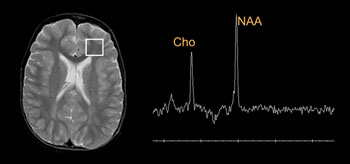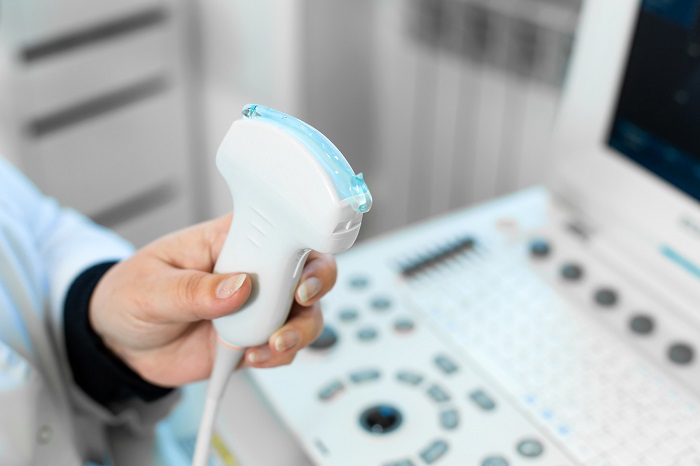Innovative MRS Study of Stuttering in Adults and Children
|
By Andrew Deutsch Posted on 30 Nov 2016 |

Image: A magnetic resonance spectroscopy (MRS) of a child’s brain (Photo courtesy of Cincinnati Children\'s Hospital).
Researchers in the USA have conducted an innovative study to investigate brain regions in adults and children who stutter using proton Magnetic Resonance Spectroscopy (MRS).
The researchers confirmed, as had been shown in previous functional MRI studies, that stuttering is linked to neuro-metabolite changes in brain circuits related to speech, attention, and emotions. The results of the study were published online in the November 2016 issue of the Journal of the American Medical Association (JAMA). The unique MRS study confirmed that the development of stuttering was related to disturbances in membrane or neuronal metabolism.
The researchers from the Children's Hospital Los Angeles (Los Angeles, CA, USA; CHLA) carried out proton shift brain scans of 47 children, and 47 adults, with and without stuttering and found that the brain regions affected included the Bohland speech-production network, the default-mode network, and the emotional-memory network.
Research lead, Bradley S. Peterson, MD, Director, Institute for the Developing Mind, CHLA, said, "That stuttering is related to speech and language-based brain circuits seems clear. Attention-regulating portions of the brain are related to control circuits that are important in governing behavior. People with changes here are more likely to stutter and have more severe stuttering. And emotions like anxiety and stress also tend to make stuttering worse, likely because this network interacts with language and attention control circuits."
Related Links:
Children's Hospital Los Angeles
The researchers confirmed, as had been shown in previous functional MRI studies, that stuttering is linked to neuro-metabolite changes in brain circuits related to speech, attention, and emotions. The results of the study were published online in the November 2016 issue of the Journal of the American Medical Association (JAMA). The unique MRS study confirmed that the development of stuttering was related to disturbances in membrane or neuronal metabolism.
The researchers from the Children's Hospital Los Angeles (Los Angeles, CA, USA; CHLA) carried out proton shift brain scans of 47 children, and 47 adults, with and without stuttering and found that the brain regions affected included the Bohland speech-production network, the default-mode network, and the emotional-memory network.
Research lead, Bradley S. Peterson, MD, Director, Institute for the Developing Mind, CHLA, said, "That stuttering is related to speech and language-based brain circuits seems clear. Attention-regulating portions of the brain are related to control circuits that are important in governing behavior. People with changes here are more likely to stutter and have more severe stuttering. And emotions like anxiety and stress also tend to make stuttering worse, likely because this network interacts with language and attention control circuits."
Related Links:
Children's Hospital Los Angeles
Latest MRI News
- Low-Cost Whole-Body MRI Device Combined with AI Generates High-Quality Results
- World's First Whole-Body Ultra-High Field MRI Officially Comes To Market
- World's First Sensor Detects Errors in MRI Scans Using Laser Light and Gas
- Diamond Dust Could Offer New Contrast Agent Option for Future MRI Scans
- Combining MRI with PSA Testing Improves Clinical Outcomes for Prostate Cancer Patients
- PET/MRI Improves Diagnostic Accuracy for Prostate Cancer Patients
- Next Generation MR-Guided Focused Ultrasound Ushers In Future of Incisionless Neurosurgery
- Two-Part MRI Scan Detects Prostate Cancer More Quickly without Compromising Diagnostic Quality
- World’s Most Powerful MRI Machine Images Living Brain with Unrivaled Clarity
- New Whole-Body Imaging Technology Makes It Possible to View Inflammation on MRI Scan
- Combining Prostate MRI with Blood Test Can Avoid Unnecessary Prostate Biopsies
- New Treatment Combines MRI and Ultrasound to Control Prostate Cancer without Serious Side Effects
- MRI Improves Diagnosis and Treatment of Prostate Cancer
- Combined PET-MRI Scan Improves Treatment for Early Breast Cancer Patients
- 4D MRI Could Improve Clinical Assessment of Heart Blood Flow Abnormalities
- MRI-Guided Focused Ultrasound Therapy Shows Promise in Treating Prostate Cancer
Channels
Radiography
view channel
Novel Breast Imaging System Proves As Effective As Mammography
Breast cancer remains the most frequently diagnosed cancer among women. It is projected that one in eight women will be diagnosed with breast cancer during her lifetime, and one in 42 women who turn 50... Read more
AI Assistance Improves Breast-Cancer Screening by Reducing False Positives
Radiologists typically detect one case of cancer for every 200 mammograms reviewed. However, these evaluations often result in false positives, leading to unnecessary patient recalls for additional testing,... Read moreUltrasound
view channel
Portable Ultrasound Tool Uses AI to Detect Arm Fractures More Quickly
Suspected injuries to the upper limbs are a major reason for visits to hospital emergency departments. Currently, wait times for an X-ray and subsequent doctor consultation can vary widely, typically ranging... Read more.jpg)
Diagnostic System Automatically Analyzes TTE Images to Identify Congenital Heart Disease
Congenital heart disease (CHD) is one of the most prevalent congenital anomalies worldwide, presenting substantial health and financial challenges for affected patients. Early detection and treatment of... Read more
Super-Resolution Imaging Technique Could Improve Evaluation of Cardiac Conditions
The heart depends on efficient blood circulation to pump blood throughout the body, delivering oxygen to tissues and removing carbon dioxide and waste. Yet, when heart vessels are damaged, it can disrupt... Read more
First AI-Powered POC Ultrasound Diagnostic Solution Helps Prioritize Cases Based On Severity
Ultrasound scans are essential for identifying and diagnosing various medical conditions, but often, patients must wait weeks or months for results due to a shortage of qualified medical professionals... Read moreNuclear Medicine
view channel
New PET Biomarker Predicts Success of Immune Checkpoint Blockade Therapy
Immunotherapies, such as immune checkpoint blockade (ICB), have shown promising clinical results in treating melanoma, non-small cell lung cancer, and other tumor types. However, the effectiveness of these... Read moreNew PET Agent Rapidly and Accurately Visualizes Lesions in Clear Cell Renal Cell Carcinoma Patients
Clear cell renal cell cancer (ccRCC) represents 70-80% of renal cell carcinoma cases. While localized disease can be effectively treated with surgery and ablative therapies, one-third of patients either... Read more
New Imaging Technique Monitors Inflammation Disorders without Radiation Exposure
Imaging inflammation using traditional radiological techniques presents significant challenges, including radiation exposure, poor image quality, high costs, and invasive procedures. Now, new contrast... Read more
New SPECT/CT Technique Could Change Imaging Practices and Increase Patient Access
The development of lead-212 (212Pb)-PSMA–based targeted alpha therapy (TAT) is garnering significant interest in treating patients with metastatic castration-resistant prostate cancer. The imaging of 212Pb,... Read moreGeneral/Advanced Imaging
view channelImaging Software Improves Lung Diagnosis in Patients Allergic To Medical Contrast Dye
For up to 30% of patients who cannot use medical contrast dye due to allergies or other health conditions, diagnosing critical lung issues like pulmonary embolism can be delayed. This is because non-contrast... Read moreBone Density Test Uses Existing CT Images to Predict Fractures
Osteoporotic fractures are not only devastating and deadly, especially hip fractures, but also impose significant costs. They rank among the top chronic diseases in terms of disability-adjusted life years... Read moreImaging IT
view channel
New Google Cloud Medical Imaging Suite Makes Imaging Healthcare Data More Accessible
Medical imaging is a critical tool used to diagnose patients, and there are billions of medical images scanned globally each year. Imaging data accounts for about 90% of all healthcare data1 and, until... Read more
Global AI in Medical Diagnostics Market to Be Driven by Demand for Image Recognition in Radiology
The global artificial intelligence (AI) in medical diagnostics market is expanding with early disease detection being one of its key applications and image recognition becoming a compelling consumer proposition... Read moreIndustry News
view channel
Hologic Acquires UK-Based Breast Surgical Guidance Company Endomagnetics Ltd.
Hologic, Inc. (Marlborough, MA, USA) has entered into a definitive agreement to acquire Endomagnetics Ltd. (Cambridge, UK), a privately held developer of breast cancer surgery technologies, for approximately... Read more
Bayer and Google Partner on New AI Product for Radiologists
Medical imaging data comprises around 90% of all healthcare data, and it is a highly complex and rich clinical data modality and serves as a vital tool for diagnosing patients. Each year, billions of medical... Read more

















